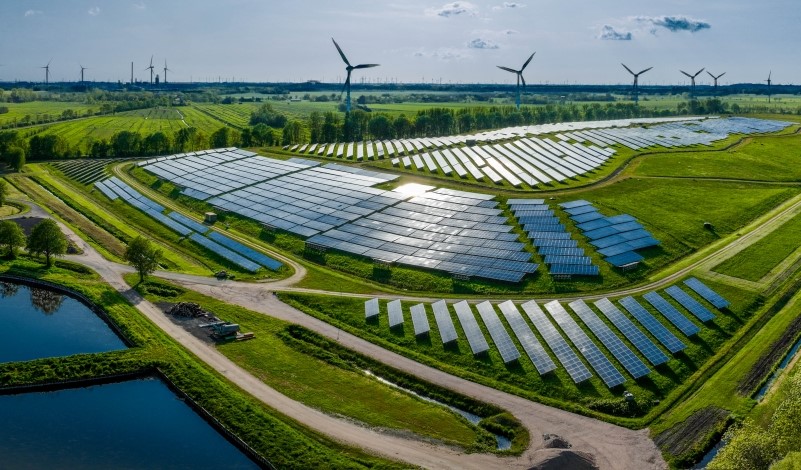
Scholar calls for targeted environmental law changes to accelerate energy projects for climate action.
On average, federal infrastructure projects in response to climate change take four and a half years to complete. In the face of escalating environmental concerns, stakeholders and scholars are urging lawmakers to take quick and decisive action on these projects to curb the deadly effects of climate change.
In a recent article, David Adelman, a law professor at the University of Texas, argues for reforms to the National Environmental Policy Act (NEPA) to make the required permitting of renewable energy projects proceed faster.
NEPA requires federal agencies to evaluate and disclose potential environmental harm caused by major federal development projects. The law also mandates that projects using federal resources or on federal land must assess impact on the physical, cultural, and human environments. For example, the Trans-Alaska Pipeline project in 1970 and the Deepwater Horizon oil spill recovery in 2017 needed environmental impact assessments.
What was once a relatively concise and efficient process of environmental review at the inception of NEPA has transformed into an expansive and prolonged evaluation process. For example, environmental reviews proscribed by NEPA currently average over 700 pages for Federal Highway Administration projects.
Even though some opponents argue for the repeal of environmental laws including NEPA, some proponents seek modifications instead.
Adelman contends that lengthy assessments can impede the timely execution of essential projects aimed at addressing the pressing concerns posed by climate change including the 16-year legal battle over the failed wind farm off the coast of Massachusetts.
Adelman’s decades-long research, however, challenges the narrative that NEPA completely inhibits the development of green infrastructure and needs to be repealed entirely. His analysis reveals that a substantial majority of energy projects use streamlined administrative procedures or bypassed federal regulations entirely. Adelman highlights that less than five percent of wind and solar projects necessitated comprehensive environmental reviews and federal litigation concerning these developments remained strikingly minimal.
Adelman calls for lawmakers and stakeholders to reevaluate the assumptions and perceptions of NEPA and its impact on green initiatives. He challenges the misconception that reforming environmental regulations means sacrificing one environmental priority for another by highlighting the frequency of regulatory streamlining and infrequent litigation under federal environmental laws. He suggests targeted reforms without compromising established environmental protections for climate action.
Moreover, Adelman underscores a critical need for recalibration in public understanding, elucidating how prevalent misunderstandings about environmental reviews and permitting processes stem from anecdotes, limited available information, and an overarching sense of cynicism surrounding administrative processes. Adelman argues for a shift toward evidence-based evaluations and proactive steps to mitigate delays and blockages arising from public opposition at state or local levels.
Adelman also recommends nuanced, targeted measures that augment NEPA rather than wholesale changes to the established law. Furthermore, Adelman suggests that the established law maintains and enhances streamlined administrative procedures. He points to the recent proposal by Senator Joe Manchin (D-W.V.) as an example of working within the confines of NEPA while still driving toward green energy goals.
Senator Manchin emerged as a pivotal figure in the reform of permitting processes. His proposed legislation in 2023 seeks to expedite the protracted permit approval timelines that have plagued critical projects. Manchin highlights the urgent need to streamline processes to enable the generation of cost-effective energy crucial for American households and businesses.
The proposed legislation aims to expedite federal agency actions, including incentives to deploy clean energy on previously contaminated mining sites, and streamline the permitting process by improving federal coordination and setting reasonable decision time frames.
Senator Manchin proposes measures to boost efficiency, data sharing, and community engagement, emphasizing the need for a workforce equipped to handle technical assessments and mitigation of environmental impacts for better project outcomes.
Adelman emphasizes the necessity of a pragmatic and nuanced approach to handling environmental regulations, advocating for targeted reforms guided by empirical evidence. He sees these reforms as crucial in harmonizing environmental priorities with the urgent action required to address climate change.
By reducing greenhouse gas emissions now, global temperatures will begin to stabilize. The impacts human activities have on climate is likely irreversible within the next 100 years. In the face of an escalating climate crisis, David Adelman’s call for targeted reforms to environmental laws like NEPA highlights a pragmatic path forward, ensuring that the urgency of climate action is met without undermining critical environmental protections.



